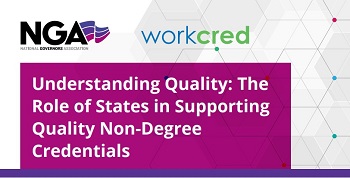
A new brief published today by Workcred, in partnership with the National Governors Association (NGA), sheds light on the value of non-degree credentials as tools to empower workers and strengthen state economies amid the significant disruption caused by COVID-19. The brief, "Understanding Quality: The Role of States in Supporting Quality Non-Degree Credentials," provides several recommendations for state policymakers to consider as they recognize and support quality credentials for people re-entering or upskilling in the workforce.
Non-Degree Credentials Support a Reinvented Workforce
The coronavirus pandemic has disrupted state economies and put millions of career paths on hold. With more than 52 million people filing for initial unemployment between mid-March and mid-July, both displaced and incumbent workers are looking to upgrade their expertise and improve their long-term employment prospects. High-quality, non-degree credentials will play a critical role in supporting economic recovery efforts by providing a pathway for workers to pivot to new positions.
To that end, governors and states have a key role to play in helping individuals identify which non-degree credentials can best help them make career transitions and improve their livelihood. Furthermore, policymakers should standardize the ways in which credentials are defined and modernize the processes by which they are deemed as valuable – an improvement that would benefit both workers and employers.
In an effort to expand credentialing education to policymakers, Workcred has partnered with the NGA to develop guidance for how states can identify which credentials meet quality thresholds and are likely to empower workers. The brief also highlights states that are leading on this issue and offers several recommendations for state policymakers, described in detail in the brief:
1. Develop standardized definitions of the different types of non-degree credentials
2. Understand and assess the quality of credentials
3. Ensure that non-degree credentials are accepted as college credit and embedded into degree programs
4. Seek out examples of state leadership in supporting worker upskilling and reskilling leading to quality credentials
"Workcred appreciates NGA’s partnership as we continue to drive educational efforts about the value of credentials that support the U.S. economy," said Dr. Roy Swift, executive director of Workcred. "This brief is an important step to support state leadership at a time when the workforce landscape is shifting at a rapid pace," he said.
“We’re thankful that Workcred is always so willing to put quality at the center of the dialogue when discussing non-degree credentials,” said Amanda Winters, program director for postsecondary education at the National Governors Association. “These programs will play an important role in our nation’s economic recovery, and we hope that this publication offers our audience an opportunity to think critically about how to empower consumers during this pivotal time,” she said.
Access to "Understanding Quality: The Role of States in Supporting Quality Non-Degree Credentials," is available on Workcred’s website and via NGA. Additionally, Workcred and NGA will present the publication to NGA’s Workforce Development Technical Assistance Program participants on September 22, 2020.
About Workcred
Formed in 2014, Workcred is an affiliate of the American National Standards Institute (ANSI) whose mission is to strengthen workforce quality by improving the credentialing system, ensuring its ongoing relevance, and preparing employers, workers, educators, and governments to use it effectively. Workcred’s vision is a labor market that relies on the relevance, quality, and value of workforce credentials for opportunities, growth, and development. Learn more at www.workcred.org.
About NGA
Founded in 1908, the National Governors Association (NGA) is the bipartisan organization of the nation's 55 governors. Through NGA, governors share best practices, address issues of national and state interest and share innovative solutions that improve state government and support the principles of federalism.
